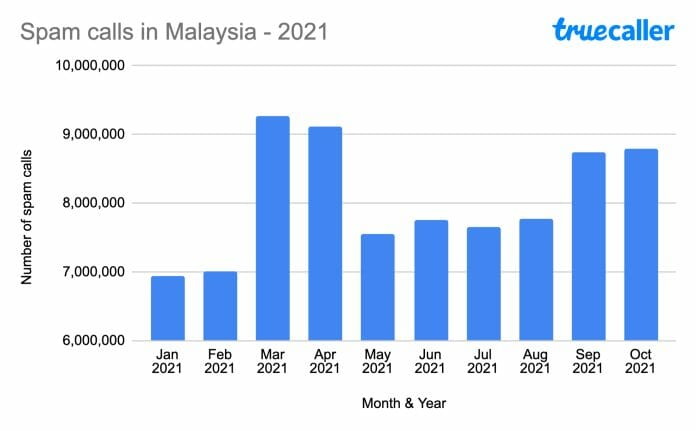It happens all the time, but many people still fall for it despite multiple reports in the media. Over the past couple of months, the number of spam call cases with losses amounting to hundreds of thousands ringgit per case was reported involving victims from all over the country, normally those aged close to retirement or retirees.
Based on news reports in the media, in Kota Baru, last September, a government pensioner in her sixties lost RM418,000 when she was duped by three men believed to be part of a Macau scam syndicate. In the same state, a civil servant in his fifties lost about RM395,000 after being cheated by Macau scam syndicate members. And in Kluang, in December, a senior citizen lost RM697,000 after becoming a victim to a Macau Scam syndicate.
Normally, the culprit behind these scams (the unknown caller) claims to be an officer from a government body such as the police, customs department, Bank Negara Malaysia, the courts or from private bodies such as banking institutions. Their purpose is to scam potential victims into believing that they have issues with the authorities, forcing them to disclose their personal and financial information.
According to the Royal Malaysia Police, a total of 5,725 cases of phone call fraud were reported throughout 2019 with RM254,586,210.94 in losses. In 2020, the number of cases increased, with 6,003 cases being logged with a reported loss of RM287,301,039.90. As of March 24, 2021, a total of 1,392 cases of phone call fraud were reported to the police with losses amounting to RM38,198,730.01.
Truecallers’ annual Global Spam Report also reveals that spammers managed to adjust to the Covid-19 pandemic. As the world is still trying to inch towards normalcy towards the end of 2021 (and staying cautious to prevent the spread of new variants), a few trends emerged.
There is a noticeable increase in total spam calls in March and it correlates to when there were fierce new Covid-19 waves sweeping across many developing nations. The increase in Covid-19 infection in March, which led to people panicking, has led to spammers and scammers capitalising on this opportunity, whether it was about selling life-saving drugs, oxygen cylinders, oxygen concentrators or securing scarce hospital beds.
During this time, the Truecaller community banded together, stepping up and marking Covid-related scams, resulting in lower numbers over April and May. The downturn could also be a result of high rates of Covid-19 infections across different countries. As the active cases dipped, there was a direct correlation in spam, and sharp increases can be seen in the months between June and October 2021.
How Malaysia Fares in Spam Rankings
Despite the many cases of people becoming victims of spam and scam, Malaysia is not on Truecaller’s list of the 20 most spammed countries in the world. However, that does not mean Malaysians are immune to spam. In fact, counting the average number of spam calls per user per month, Malaysia would rank at number 32, which equates to each Malaysian receiving 3.5 spam calls per month on average.
The Global Spam Report states of all the spam calls that Malaysians receive, 99 percent are of domestic origin while the remaining 1 percent originate from overseas. On average, Truecaller users in Malaysia collectively receive over 8 million spam calls per month, and 9 out of 10 of all these spam calls in Malaysia were correctly identified by Truecaller.
Over 16.8 percent of all these spam calls have been tagged as scams by users in Malaysia. March and April 2021 saw an unusually high number of spam calls received: well over 9 million calls each in both months with another significant high in the months of September and October 2021.
Category Key
The spam calls people receive come in various forms and formats, and culprits are getting good by the day in fooling the victims. One of the common types of spam calls is sales calls. In this case, companies or people are calling you to sell you something, usually without prior permission. This includes telemarketing calls, promotional calls from companies, surveys, political calls, new client outreach for services, subscriptions, hospitals, health care services, private medical practice, pathology labs and so on. It also includes calls from cellular operators (telecom companies) trying to upsell data plans, promotions, etc.
Next is a nuisance call. Due to this being a broad spectrum of calls, this is defined generally as: calls that are unwanted, a disturbance for users, harassment or pranks. There are also spam calls related to financial services “involving” banks, credit unions, credit card companies, insurance companies and debt collection agencies (organisations that specialise in payments of debts owed by individuals or businesses, bounty hunters, collection agents).
Next are robocalls. Robocalls are automated calls that are placed to people with a pre-recorded message. Some of these calls can sound like real people talking. When you reply to their queries, they can be very sophisticated, using voice recognition technology to answer and ask follow-up questions.
And the final call is Scam, which involves fraud attempts, money swindling, unknown links, phishing attempts etc.









